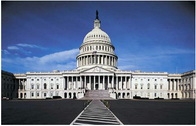Advertisement
MBA testifies before House Subcommittee on VA loans

James H. Danis II, CMB has delivered testimony on behalf of the Mortgage Bankers Association (MBA) before the House Veterans Affairs Subcommittee Economic Opportunity at a hearing on "The Status of the Loan Guarantee Program." The following is Danis' oral statement before the subcommittee, as prepared for delivery:
"Chairwoman Herseth Sandlin, Ranking Member Boozman, and members of the subcommittee, thank you for the opportunity to testify on behalf of the Mortgage Bankers Association. My name is Jim Danis and I am the president of Residential Mortgage Corp. in Fayetteville, N.C., a Certified Mortgage Banker, and MBA member.
I have been in the mortgage business for 17 years and have worked with the VA Home Loan Guaranty Program my entire career. I know full well how important it is to the men and women of our military.
Today, approximately 70 percent of the loans my company closes are through the VA. As credit markets have tightened and loan underwriting has become more strict, finding affordable low-downpayment mortgages has become increasingly difficult. That is where the VA comes in, providing 100 percent LTV loans to our veterans who have dedicated their lives to serving our country.
The VA program has been a tremendous success and the numbers pretty much speak for themselves. The homeownership rate among veterans is astounding 82 percent, compared to 67 percent for the general population.
And VA loans have performed better than any other segment of the market. Despite most of these borrowers not having 'skin in the game,' VA loans have outperformed their counterparts through the recent housing crisis. According to MBA data, the seriously delinquency rate for the first quarter of 2010 was 5.29 percent--well below even the seven percent delinquency rate for prime loans.
The VA portfolio has been able to weather today's turbulent market largely due to its conservative underwriting standards. VA mortgages have always been fully documented and fully underwritten loans on owner-occupied properties.
Madame Chairwoman, although the VA Guaranty Loan Program has had an excellent track record of providing benefits to veterans and active duty military personnel, MBA would like to recommend a few ways to keep it strong.
First and foremost, Congress should avoid mandating costly new risk retention requirements that could cripple the program and harm our economic recovery. Both the House and Senate financial reform bills contain provisions that would require mortgagees and securitizers to retain a 5-percent interest in any mortgage they originate, sell, or securitize. This will directly hurt the VA program and it will also harm small independent lenders like my company, which serves military communities.
Congress should specifically exempt VA loans, as well as any other loans or securities insured or guaranteed by the government, such as FHA, Rural Housing, Fannie Mae, and Freddie Mac. Failure to exclude the VA and other safe and properly underwritten loans will negatively affect the housing recovery and veterans' opportunities to secure affordable home mortgages.
To further help with the housing recovery, Congress should extend VA's higher loan limits. The Veterans Benefits Improvement Act of 2008 provided a temporary increase in the maximum guaranty for loans closed through the end of 2011. It also allows borrowers to refinance 100 percent of the value of their home. Prior to this, refinances were generally limited to 90 percent. MBA supports these changes and we thank this subcommittee for ensuring that veterans who reside in high-cost areas can enjoy their much deserved housing benefits. We would ask that Congress consider extending these limits until the housing crisis has subsided.
MBA would further recommend that the VA loan program be reviewed and updated so that it is better aligned with prudent, industry standards. VA management should have the flexibility to make programmatic changes that keep the program competitive, current, and relevant in a rapidly changing market. And while my company does not service loans, I know that MBA's members who do, often report that VA's processes can be made simpler and more cost-effective. My full written statement goes into greater detail on these important, highly technical issues. We believe these changes would encourage more lenders to participate in the VA program, which would directly benefit military families.
Madame Chairwoman, I want to close on a personal note. My commitment to the VA program goes beyond merely professional. The homes my parents purchased to raise me and my siblings were bought with VA loans. And in keeping with our family tradition, after my discharge from the Army in 1989, I financed my very first home with a VA loan. For so many reasons, I am a strong advocate of this important program. It is invaluable to the brave men and women who have sacrificed so much for this country, and the enhancements discussed in my testimony would make it even more attractive and beneficial to veterans and their families.
For more information, visit www.mortgagebankers.org.
About the author





